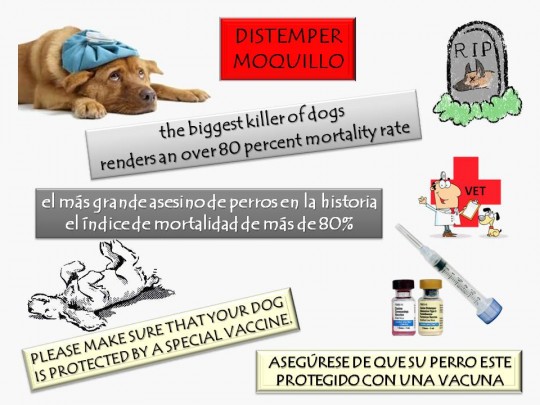
Not a month passes that we don’t receive reports about new DISTEMPER cases in our county. So our message to all pet owners: PLEASE MAKE SURE THAT YOUR ANIMALS HAVE ALL CURRENT SHOTS. Dogs who aren’t up on their shots are the most vulnerable. The disease can be spread from dog to dog, through any of the following secretions – blood, urine, saliva, pus and fecal matter. Dogs that are not properly vaccinated may also contract the virus from the air, as well as eating infected food. Distemper is historically the biggest killer of dogs and renders an over 80 percent mortality rate in the USA alone. Down here infected animals get euthanized if diagnosed with distemper.
The percentage of unvaccinated dogs in our county is even higher than expected, as we’ve discovered that even some of the animals which have caring owners, have missed their shots for years. And of course there are the strays and the low income families’ pets, who’ve never seen a veterinarian in their entire lives – their condition is awful, due mostly to lack of proper nutrition. Their immune system is not prepared to fight any kind of contagious disease, and they are the first victims of this horrific disease.
PLEASE MAKE SURE THAT YOUR DOG IS PROTECTED BY A SPECIAL VACCINE.
Here are the typical symptoms of distemper. They vary considerably, depending on the strain of the virus and the dog’s immunity, and they don’t need to happen all together the same time.
- fever, which could go unnoticed and then peak again later.
- eye and/or nose discharge – most of the animals we’ve lost in our area so far had really bad conjunctivitis, (discharge from the eyes) light sensitivity
- as well as loss of appetite.
- cough, labored breathing (pneumonia)
- vomiting
- lack of muscle co-ordination – animal walking as though it was drunk.
- muscle spasm
- partial paralysis
- progressive deterioration of motor skills
- seizures that can affect any part of the body – One type of seizure that affects the head, and is unique to distemper, is sometimes referred to as a “chewing gum fit” because the dog appears to be chewing gum
- depression
- increased sensitivity to pain or touch
If you have any questions or doubts, please talk to your vet.



